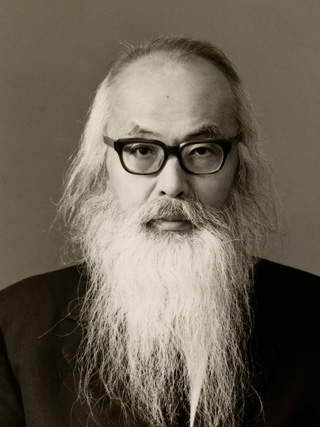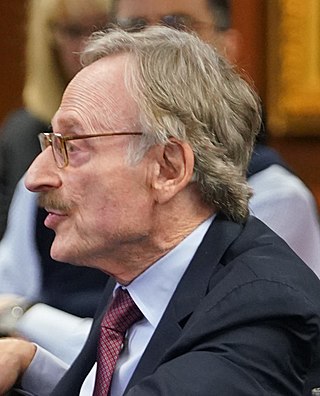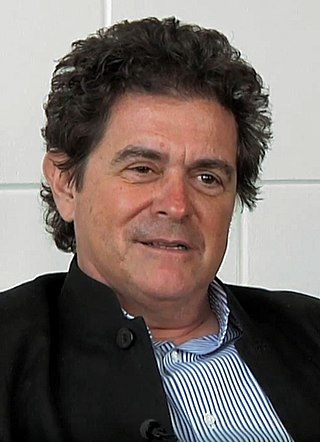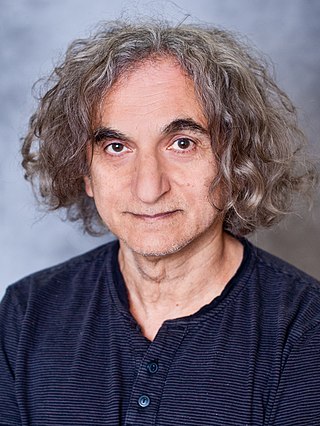Related Research Articles

The Four Asian Tigers are the developed Asian economies of Hong Kong, Singapore, South Korea, and Taiwan. Between the early 1950s and 1990s, they underwent rapid industrialization and maintained exceptionally high growth rates of more than 7 percent a year.
Business cycles are intervals of general expansion followed by recession in economic performance. The changes in economic activity that characterize business cycles have important implications for the welfare of the general population, government institutions, and private sector firms.
Robert Joseph Barro is an American macroeconomist and the Paul M. Warburg Professor of Economics at Harvard University. Barro is considered one of the founders of new classical macroeconomics, along with Robert Lucas Jr. and Thomas J. Sargent. He is currently a senior fellow at Stanford University's Hoover Institution and co-editor of the influential Quarterly Journal of Economics.
The Solow–Swan model or exogenous growth model is an economic model of long-run economic growth. It attempts to explain long-run economic growth by looking at capital accumulation, labor or population growth, and increases in productivity largely driven by technological progress. At its core, it is an aggregate production function, often specified to be of Cobb–Douglas type, which enables the model "to make contact with microeconomics". The model was developed independently by Robert Solow and Trevor Swan in 1956, and superseded the Keynesian Harrod–Domar model.
Robert JamesGordon is an American economist. He is the Stanley G. Harris Professor of the Social Sciences at Northwestern University. Gordon is one of the world’s leading experts on inflation, unemployment, and long-term economic growth. His recent work asking whether economic growth in the US is “almost over” has been widely cited, and in 2016, he was named one of the 50 most influential people in the world by Bloomberg.

Hirofumi Uzawa was a Japanese economist.

Michael Jay Boskin is the T. M. Friedman Professor of Economics and senior fellow at Stanford University's Hoover Institution. He also is chief executive officer and president of Boskin & Co., an economic consulting company.
Mainstream economics is the body of knowledge, theories, and models of economics, as taught by universities worldwide, that are generally accepted by economists as a basis for discussion. Also known as orthodox economics, it can be contrasted to heterodox economics, which encompasses various schools or approaches that are only accepted by a minority of economists.

Fabrizio Zilibotti is an Italian economist. He is the Tuntex Professor of International and Development Economics at Yale University. Zilibotti was previously professor of economics at University College London, the University of Zürich, and at the Institute for International Economic Studies in Stockholm.
The Journal of Political Economy is a monthly peer-reviewed academic journal published by the University of Chicago Press. Established by James Laurence Laughlin in 1892, it covers both theoretical and empirical economics. In the past, the journal published quarterly from its introduction through 1905, ten issues per volume from 1906 through 1921, and bimonthly from 1922 through 2019. The editor-in-chief is Magne Mogstad.

Alberto Francesco Alesina was an Italian economist who was the Nathaniel Ropes Professor of Political Economy at Harvard University from 2003 until his death in 2020. He was known principally as an economist of politics and culture, and was famed for his usage of economic tools to study social and political issues. He was described as having “almost single-handedly” established the modern field of political economy, and as a likely contender for the Nobel Memorial Prize in Economic Sciences.

Oded Galor is an Israeli-American economist who is currently Herbert H. Goldberger Professor of Economics at Brown University. He is the founder of unified growth theory.

Paul Davidson was an American macroeconomist who has been one of the leading spokesmen of the American branch of the post-Keynesian school in economics. He has actively intervened in important debates on economic policy from a position critical of mainstream economics.
David Hibbard Romer is an American economist, the Herman Royer Professor of Political Economy at the University of California, Berkeley, and the author of a standard textbook in graduate macroeconomics as well as many influential economic papers, particularly in the area of New Keynesian economics. He is also the husband and close collaborator of Council of Economic Advisers former Chairwoman Christina Romer.

Frank Horace Hahn FBA was a British economist whose work focused on general equilibrium theory, monetary theory, Keynesian economics and critique of monetarism. A famous problem of economic theory, the conditions under which money, which is intrinsically worthless, can have a positive value in a general equilibrium, is called "Hahn's problem" after him. One of Hahn's main abiding concerns was the understanding of Keynesian (Non-Walrasian) outcomes in general equilibrium situations.

Macroeconomic theory has its origins in the study of business cycles and monetary theory. In general, early theorists believed monetary factors could not affect real factors such as real output. John Maynard Keynes attacked some of these "classical" theories and produced a general theory that described the whole economy in terms of aggregates rather than individual, microeconomic parts. Attempting to explain unemployment and recessions, he noticed the tendency for people and businesses to hoard cash and avoid investment during a recession. He argued that this invalidated the assumptions of classical economists who thought that markets always clear, leaving no surplus of goods and no willing labor left idle.
Bowley's law, also known as the law of the constant wage share, is a stylized fact of economics which states that the wage share of a country, i.e., the share of a country's economic output that is given to employees as compensation for their work, remains constant over time. It is named after the English economist Arthur Bowley. Research conducted near the start of the 21st century, however, found wage share to have declined since the 1980s in most major economies.

Martin Stewart Eichenbaum is the Charles Moskos professor of economics at Northwestern University, and the co-director of the Center for International Economics and Development. His research focuses on macroeconomics, international economics, and monetary theory and policy.

Emi Nakamura is a Canadian-American economist. She is the Chancellor's Professor of Economics at University of California, Berkeley. Nakamura is a research associate and co-director of the Monetary Economics Program of the National Bureau of Economic Research, and a co-editor of the American Economic Review.
Yu-Chin Chen is an economist and researcher at the University of Washington. Her research fields include international finance, macroeconomics, open economy macroeconomics, trade and development, and applied economics. She has served as a staff economist for the Clinton administration and is currently an economics professor at the University of Washington. Classes she teaches include Macroeconomic Analysis, International Financial Monetary Economics, and Computational Finance and Financial Econometrics.
References
- ↑ "Milton Friedman Institute for Research in Economics". Archived from the original on 2011-03-20. Retrieved 2011-03-02.
- ↑ Young, Alwyn (August 1995). "The Tyranny of Numbers: Confronting the Statistical Realities of the East Asian Growth Experience" (PDF). The Quarterly Journal of Economics. 110 (3): 641–680. doi:10.2307/2946695. JSTOR 2946695. S2CID 115135123.
- ↑ Young, Alwyn (1992). "A Tale of Two Cities: Factor Accumulation and Technical Change in Hong Kong and Singapore". NBER Macroeconomics Annual. 7. University of Chicago Press: 13–54. doi: 10.2307/3584993 . JSTOR 3584993.
- ↑ Young, Alwyn (September 2009), The African Growth Miracle (PDF), London School of Economics, archived from the original (PDF) on 2013-05-20, retrieved 2013-03-06